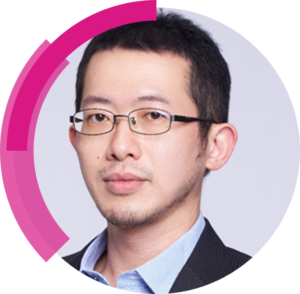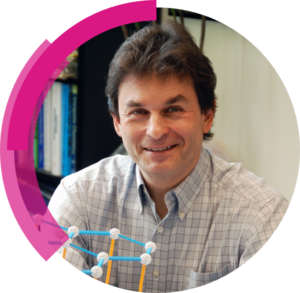Introducing the Materials Horizons Outstanding Reviewers.
This year we are pleased to celebrate the tenth anniversary of Materials Horizons. We are so grateful to our fantastic community of authors, reviewers, Board members and readers and wanted to showcase just some of them in a series of ‘Community Spotlight’ blog articles.
In our third ‘Community Spotlight’, we feature some of the outstanding reviewers who have supported Materials Horizons over the years. Our outstanding reviewers are selected each year for their excellence in maintaining the reliability and integrity of the Materials Horizons peer review process. We have asked them what they like most about being a reviewer for Material Horizons and about their own insights into what makes a great article and a great reviewer. Check out their interview responses and related articles below.
| Markus Suta, Outstanding Reviewer.
Heinrich Heine University Düsseldorf, Germany |
Markus Suta studied both Chemistry and Physics at the University of Siegen in Germany and obtained his PhD in Chemistry in 2017. He followed up with a postdoc at the University of Utrecht, the Netherlands in Prof. Andries Meijerink’s group. Since 2021, he holds a position as a tenure track professor at the Heinrich Heine University Düsseldorf, Germany. His group combines solid-state chemistry with advanced photoluminescence spectroscopy and theoretical modelling to better fundamentally understand and design luminescent materials for various applications. He is currently also member of the “Young College” of the North-Rhine Westphalian Academy of Sciences and Arts.
What do you like most about being a reviewer for Materials Horizons?
“You get to know research at the forefront of materials science at quite an early point and sometimes are just blasted by the excellent ideas of other researchers. On top, you can actively help even further improve their drafts – which can also be stimulating for joining forces or get a fresh new viewpoint on your own research.”
What has been your biggest learning point from reviewing?
“No matter how deep you are in your research topic and how carefully you read a manuscript – if you see the other reviews you often realize what you still have missed. This always shows me that multiple viewpoints – sometimes even off-topic – actually enrich the quality of a manuscript.”
You can read some of Markus’ recent research in Journal of Materials Chemistry C here:
Natalia Stopikowska, Przemysław Woźny, Markus Suta, Teng Zheng, Stefan Lis and Marcin Runowski.
J. Mater. Chem. C, 2023,11, 9620-9627. DOI: 10.1039/D3TC01684F
How to calibrate luminescent crossover thermometers: a note on “quasi”-Boltzmann systems
Benedikt Bendela and Markus Suta.
J. Mater. Chem. C, 2022,10, 13805-13814. DOI: 10.1039/D2TC01152B
Dietrich Püschel, Julia Wiefermann, Simon Hédé, Tobias Heinen, Leo Pfeifer, Oliver Weingart, Markus Suta, Thomas J. J. Müller and Christoph Janiak.
J. Mater. Chem. C, 2023,11, 8982-8991. DOI: 10.1039/D3TC01228J
| Michael Dickey, Outstanding Reviewer.
North Carolina State University, USA |
Michael Dickey received a BS in Chemical Engineering from Georgia Institute of Technology (1999) and a PhD from the University of Texas (2006) under the guidance of Professor Grant Willson. From 2006-2008 he was a post-doctoral fellow in the lab of Professor George Whitesides at Harvard University. He is currently the Camille and Henry Dreyfus Professor in the Department of Chemical & Biomolecular Engineering at NC State University. He completed a sabbatical at Microsoft in 2016. Michael’s research interests include soft matter (liquid metals, gels, polymers) for soft and stretchable devices (electronics, energy harvesters, textiles, and soft robotics)
What encouraged you to become a reviewer for Materials Horizons?
“It helps me stay up to date on the latest work in the field of materials.”
What would you recommend to new reviewers to ensure their report is helpful?
“The review should be clearly written. Any critical comments should be justified so the authors have the chance to improve. Serving in an anonymous role like a reviewer comes with great responsibility. “
Discover some of Michael’s recent research in our RSC journals here:
Applications of liquid metals in nanotechnology
Francois-Marie Allioux, Mohammad B. Ghasemian, Wanjie Xie, Anthony P. O’Mullane, Torben Daeneke, Michael D. Dickey and Kourosh Kalantar-Zadeh.
Nanoscale Horiz., 2022,7, 141-167. DOI: 10.1039/D1NH00594D
Broad-spectrum treatment of bacterial biofilms using magneto-responsive liquid metal particles
Samuel Cheeseman, Aaron Elbourne, Rashad Kariuki, Aswin V. Ramarao, Ali Zavabeti, Nitu Syed, Andrew J. Christofferson, Ki Yoon Kwon, Woojin Jung, Michael D. Dickey, Kourosh Kalantar-Zadeh, Christopher F. McConville, Russell J. Crawford, Torben Daeneke, James Chapman and Vi Khanh Truong.
J. Mater. Chem. B, 2020,8, 10776-10787. DOI: 10.1039/D0TB01655A
| Sheng-Heng Chung, Outstanding Reviewer.
National Cheng Kung University, Taiwan. |
 Sheng-Heng Chung received his B.S. in Resource Engineering and Materials Science and Engineering from National Cheng Kung University and his M.S. in Materials Science and Engineering from National Tsing Hua University in Taiwan. He joined the Ph.D. program in Materials Science and Engineering and worked as a research associate with Professor Arumugam Manthiram at the University of Texas at Austin. Currently, he is an associate professor in the Department of Materials Science and Engineering at National Cheng Kung University. His current research focuses on electrochemical conversion and storage technology.
Sheng-Heng Chung received his B.S. in Resource Engineering and Materials Science and Engineering from National Cheng Kung University and his M.S. in Materials Science and Engineering from National Tsing Hua University in Taiwan. He joined the Ph.D. program in Materials Science and Engineering and worked as a research associate with Professor Arumugam Manthiram at the University of Texas at Austin. Currently, he is an associate professor in the Department of Materials Science and Engineering at National Cheng Kung University. His current research focuses on electrochemical conversion and storage technology.
What has been your biggest learning point from reviewing?
“After reviewing thousands of peer-reviewed papers from more than 100 journals, I really appreciate the opportunity to have access to the high-ranking manuscript from prestigious journals. Reviewing the initially submitted manuscript, commenting the follow-up revision, and reading the published papers that I reviewed teach me the rigorous way to prepare our manuscript with sufficient data and detailed analysis. The reviewing processes also allow me to change my way of thinking about what my colleagues and I should bring to the reviewers and readers. Most importantly, serving as a reviewer is important for me to contribute my skills to the research field.”
Has being a reviewer affected how you approach the preparation of your recent manuscripts?
“Serving as a reviewer for Materials Horizons, I always receive the manuscript with high standard and new scientific knowledge. These high-level papers inspire me to organize my manuscript and evaluate my research. It is very important to adopt these excellent manuscripts’ writing and formatting to make my manuscript easy to read and look good. I also learn that the best way to present our best research is not only to publish the data as soon as possible, but also to support the ground-breaking data with solid evidence. I am also learning how to deal with rejection. After feeling sad, it is more useful to move on and revise my manuscript based on the reviewers’ constructive suggestions and make the rejected paper a better one. “
Check out Sheng-Heng’s latest research in Journal of Materials Chemistry A:
Lithium–sulfur cells with a sulfide solid electrolyte/polysulfide cathode interface
Yin-Ju Yena and Sheng-Heng Chung.
J. Mater. Chem. A, 2023,11, 4519-4526. DOI: 10.1039/D2TA07806F
Yun-Chen Wu and Sheng-Heng Chung.
J. Mater. Chem. A, 2023,11, 9455-9463. DOI: 10.1039/D3TA00210A
Composite gel-polymer electrolyte for high-loading polysulfide cathodes
Li-Ling Chiu and Sheng-Heng Chung.
J. Mater. Chem. A, 2022,10, 13719-13726. DOI: 10.1039/D2TA01867E
| Richard Kaner, Outstanding Reviewer
University of California, Los Angeles (UCLA), USA |
Richard Kaner received a Ph.D. from the University of Pennsylvania in 1984 working with Prof. Alan MacDiarmid (Nobel Laureate 2000, deceased). After postdoctoral research at Berkeley, he joined the University of California, Los Angeles (UCLA) in 1987, earned tenure in 1991, became a full professor in 1993, a Distinguished Professor in 2012 and was appointed to the Dr. Myung Ki Hong Endowed Chair in Materials Innovation in 2017.
He has published over 460 papers in top peer reviewed journals and holds 73 U.S. patents. According to the most recent Clarivate Analytics/Thomson-Reuters rankings, he is among the world’s most highly cited authors. Professor Kaner has received awards from the Dreyfus, Fulbright, Guggenheim, Packard and Sloan Foundations along with the Materials Research Society Medal, the Royal Society of Chemistry Centenary Prize, the Chemical Pioneer Award from the American Institute of Chemistry and the American Chemical Society’s Buck-Whitney Research Award, Tolman Medal, Award in the Chemistry of Materials and the Award in Applied Polymer Science for his work on refractory materials including new synthetic routes to ceramics, intercalation compounds, superhard metals, graphene and conducting polymers.
He has been elected a Fellow of the American Association for the Advancement of Science (AAAS), the American Chemical Society (ACS), the American Physical Society (APS), the European Academy of Sciences (EurASc), the European Academy of Sciences and Arts (Euro-Acad), the Materials Research Society (MRS) and the Royal Society of Chemistry (FRSC).
What do you think of Materials Horizons as a place to publish impactful materials chemistry research?
“Materials Horizons is a great place to publish high impact research across all areas involving new and exciting materials and their applications.”
Where do you see the materials chemistry field in the next 10 years?
“Materials have become one of the hottest areas in scientific exploration. They will continue to drive our economy in terms of new and improved products from safer and longer lasting batteries to enhanced electronics. As plastics have been ubiquitous, hopefully we will begin to see economical ways to reuse, up-cycle and ultimately depolymerize them to then form other useful materials.”
You can read Richard’s research in Materials Horizons here:
Crystalline tetra-aniline with chloride interactions towards a biocompatible supercapacitor
Xiaoling Tong, Guan Sheng, Dongzi Yang, Shuo Li, Cheng-Wei Lin, Wei Zhang, Zhihui Chen, Chaohui Wei, Xianzhong Yang, Fei Shen, Yanyan Shao, Hui Wei, Yihan Zhu, Jingyu Sun, Richard B. Kaner and Yuanlong Shao.
Mater. Horiz., 2022,9, 383-392. DOI: 10.1039/D1MH01081F
Niobium pentoxide based materials for high rate rechargeable electrochemical energy storage
Fei Shen, Zhongti Sun, Qinggang He, Jingyu Sun, Richard B. Kaner and Yuanlong Shao.
Mater. Horiz., 2021,8, 1130-1152. DOI: 10.1039/D0MH01481H
| Joachim Vollbrecht, Outstanding Reviewer.
Institute for Solar Energy Research in Hamelin (ISFH), Germany. |
Joachim Vollbrecht obtained his B. Sc. in Chemistry and M. Sc. in Optoeletronics and Photonics at the University of Paderborn. Then, he worked in the group of Prof. Kitzerow on liquid crystalline organic semiconductor materials that were applied in organic light emitting diodes and organic thin film transistors. After graduating with his Dr. rer. Nat. in Physical Chemistry (2016), he moved from the University of Paderborn to the US and joined the group of Prof. Nguyen, as a Feodor Lynen postdoctoral fellow to the Center of Polymers and Organics Solids at the University of California, Santa Barbara. There he conducted research on non-fullerene organic photovoltaic devices and organic photodetectors. He returned to Germany to the group of Prof. Neher at the Institute of Physics and Astronomy at the University of Potsdam, where he worked on the recombination dynamics of organic solar cells. Currently, he is employed as project leader at the Institute for Solar Energy Research in Hamelin (ISFH), conducting research on perovskite solar cells.
What do you like most about being a reviewer for Materials Horizons?
“It is one of the best opportunities to have “early-access” to some of the most cutting-edge research in materials science and it also offers a wide variety of research topics to choose from.”
What would you recommend to new reviewers to ensure their report is helpful?
“Treat each review as if you – as the reviewer – would also be part of the list of authors. How can you give constructive feedback that would make this manuscript its best version possible? Would you sign the results presented in the manuscript with your own name and would you vouch for its contents?”
You can read about Joachim’s recent research in his article, currently in press, in Energy Advances here:
On the relationship of the effective mobility and photoconductance mobility in organic solar cells
Joachim Vollbrecht, Nurlan Tokmoldin, Bowen Sun, Elifnaz Saglamkaya, Lorena Perdigón-Toro, Seyed Mehrdad Hosseini, Jae Hoon Son, Han Young Woo, Safa Shoaee and Dieter Neher.
Energy Adv., 2023,2, 1390-1398. DOI: 10.1039/D3YA00125C
We hope you enjoy reading about some of our wonderful outstanding reviewers. Next month we return to showcase some more members of our esteemed Advisory Board!
Or to read more of our community spotlight blog, return to the home page here














